- Home
- Simon Beckett
The Chemistry of Death dh-1 Page 12
The Chemistry of Death dh-1 Read online
Page 12
Dinner at Jenny Hammond's house that evening.
I told myself it was no big thing. That she, or rather her friend Tina, was just being friendly. When I'd lived in London a dinner invitation had been simply polite currency, offered and accepted without much thought. This was no different, I told myself.
It didn't work.
I wasn't in London now. My social life had become reduced to bland conversations with patients or a beer in the pub. And what were we going to talk about? There was only one subject in the village at the moment, and that would hardly make for light dinner-table chat between strangers. Especially not if they'd also heard the rumours about me. I wished I'd had the presence of mind to say no when the offer was made. I even considered calling with some excuse, offering my apologies.
But, as much as the thought of the meal unsettled me, I didn't make the call. Which was almost as unsettling in itself. Because, underneath it all, I was uncomfortably aware of why I was really so nervous. It was the thought of seeing Jenny again. It stirred up a complex silt of emotions I'd rather have left settled. Right up there among them was guilt.
It felt like I was preparing to be unfaithful.
Of course, I realized how ridiculous that was. I was only going for a meal, and since a drunken businessman had lost control of his BMW that afternoon almost four years ago, I was all too aware that there was no-one for me to be unfaithful to.
But again, that made no difference.
So as I parked the car and took the lift to the laboratory, I wasn't exactly focused. I tried to pull my thoughts together as I pushed open the steel door to the mortuary lab and went in. Marina was there already. The door was still swinging shut behind me when she spoke.
'The results are back.'
Mackenzie frowned down at the report I'd given him. 'You're sure?'
'Pretty much. The tests confirm that Sally Palmer had been dead for around nine days when her body was found.'
We were in the lab's small office. I'd offered to email the results, but when I'd called him he'd said he'd call around instead.
'How reliable is that?' he asked now.
'The amino acid analysis is accurate to twelve hours either way, which is as close as you're going to get. I can't tell you the exact time she was killed, but it was some time between noon on the Friday and Saturday.'
'You can't narrow it down any more than that?'
I resisted the urge to snap. I'd spent all morning working out the time-since-death equations. It was a complicated business, factoring in the test results with the average temperature and other weather data for the days that Sally Palmer's body had lain outside. Life's biggest mystery reduced to a banal mathematical formula.
'Sorry. But taking into account everything else, the maggots and so on, I'd put it pretty well in the middle of that range.'
'Call it midnight Friday, then. And she was last seen three days before that at the barbecue.' Mackenzie frowned at the implications. 'There's no way you can be as specific for the dog?'
'A dog's body chemistry is different to a human's. I could run the analysis but it wouldn't tell us anything.'
'Shit,' he muttered. 'But you still think it was dead longer than that?'
I shrugged. All I had to go on was the condition of the dog's body and the insect activity around it, and that was hardly an exact science. 'Pretty sure, but like I say, the same rules don't necessarily apply to dogs. But two or three days more, at least.'
Mackenzie pulled at his lip. I knew what he was thinking. This was the third day since Lyn Metcalf had disappeared. Even if the killer followed the same pattern as before and was holding her somewhere, we were entering the endgame now. Whatever warped agenda he was following, if it hadn't already run its course it soon would.
Unless she was found first.
'We've also got the analysis on the substance that was in one of the knife marks on Sally Palmer's vertebra,' I told Mackenzie. I read from my own copy of the report. 'It's a hydrocarbon. Fairly complex, but around eighty per cent carbon, ten per cent hydrogen, with small amounts of sulphur, oxygen, nitrogen and a few trace metals.'
'Meaning?'
'Bitumen. Common-or-garden bitumen. The sort of stuff you can buy in any hardware or DIY store.'
'Well, that narrows it down.'
Something flickered faintly in the back of my mind, a synaptic connection sparked by something that had just been said. I reached for it but it remained elusive.
'Anything else?' Mackenzie asked, and whatever almost-thought I'd had slipped away.
'Not really. I've still got to examine the knife marks on the dog's spine. With luck that'll confirm that the same weapon killed them both. Then I'll be finished.'
Mackenzie looked as though he'd expected as much but hoped for more.
'How about your end? Any more developments?' I asked.
I could see the answer from the way Mackenzie's face closed down. 'We're following up a few leads,' he said, stiffly.
I said nothing. After a moment he sighed.
'We've got no suspect, no witnesses and no motive. So, "no" is the short answer. Door-to-door inquiries haven't turned up anything, and even though we've restarted the search we're still having to go slow to check for traps. And it's going to be impossible to cover an area like this. Half of it's like a bloody swamp, and then there's Christ knows how many bloody woods and ditches.'
He shook his head, frustration getting the better of him again. 'If he's decided to hide her body properly we might never find her.'
'You think she's dead, then.'
The look he gave me was jaded. 'You've been involved with enough murder investigations. How often do we get them back alive?'
'It happens.'
'Yeah, it happens,' he conceded. 'But so does winning the lottery. Frankly, I'd give better odds on that than Lyn Metcalf surviving. Nobody's seen anything, nobody knows anything. Forensic didn't find any useful evidence either where she was snatched or where we found Sally Palmer's body. Nothing's been flagged when we checked criminal records or the Sex Offenders Register. All we've got to go on is that the suspect must be reasonably strong and fit and knows a bit about woodcraft and hunting.'
'Doesn't narrow it down much, does it?'
He gave a sour laugh. 'Not much. It might if this was Milton Keynes, but a country community like this, hunting's a way of life. People don't even notice it. No, whoever he is, so far our boy's been able to stay under the radar.'
'What about profiling?'
'Same problem. We just don't have enough to go on. The only profile the psychologists can come up with is so vague it's useless. We're dealing with an outdoor type who's physically fit and reasonably intelligent, but still reckless or careless enough to have left Sally Palmer's body where it could be found. That could apply to half the men in the village. Extend that to neighbouring villages as well and you're looking at two or three hundred potential suspects.'
He sounded depressed. I couldn't blame him. I was no expert, but I knew from experience that most serial killers were found either by luck or because they made some glaring mistake. They're chameleons, apparently ordinary members of society who hide in plain view. When they're finally exposed the first reaction of friends and neighbours is always disbelief. Only with hindsight are the jagged, saw-toothed edges that have been there all along finally recognized. Regardless of what atrocities they've committed, the single most shocking thing about our real-life monsters is how normal they seem.
Just like you and me.
Mackenzie scratched at the mole on his neck. He stopped when he caught me watching. 'There's one thing that's come up that might be important,' he said, with a casualness that wasn't entirely convincing. 'One witness who spoke to Sally Palmer at the barbecue says she was annoyed because someone had left a dead stoat on her doorstep. She thought it was a sick idea of a joke.'
I thought about the swan wings that had been with Sally Palmer's body, and the mallard tied to the stone on the morning Lyn M
etcalf had disappeared. 'You think the killer left it there?'
He shrugged. 'Could have been kids. Or it might have been some sort of marker or warning. Staking a claim, sort of thing. We already know he uses birds as a signature. There's nothing to say he might not use animals as well.'
'What about Lyn Metcalf? Did she find anything like that?'
'She mentioned to her husband about finding a dead hare in the woods the day before she disappeared. But it could just as easily have been killed by a dog or fox. There's no way of knowing now.'
He was right, but I still wondered. Coincidences happen, in murders as in every other facet of life. But given the way the killer had behaved so far, it didn't seem impossible that he was confident enough to have marked out his victims in advance.
'So you don't think there's anything to it?' I asked.
'That's not what I said,' he snapped. 'But at this stage there's not a lot we can do. We're already looking for anyone with a record of animal cruelty. A couple of people can remember a spate of cats being killed about ten, fifteen years ago, but no-one was ever caught, and – What?'
I'd started shaking my head. 'You said yourself, this isn't like a town or city. Attitudes are different here. I'm not saying people are deliberately cruel, but you don't get much sentiment, either.'
'Meaning no-one would notice a few dead animals,' he said, flatly.
'If someone set fire to a dog on the village green there'd probably be a reaction. But this is the countryside. Animals are killed all the time.'
He reluctantly accepted what I'd said. 'Let me know what you find out from the dog,' he said, getting to his feet. 'Anything important you can get me on my mobile.'
'Before you go,' I said, 'there's something else you should know.'
I told him about the rumour circulating in the village that I'd been arrested. 'For God's sake,' he sighed, when I'd finished. 'Is it going to be a problem?'
'I don't know. I hope not. But people are getting twitchy. When they see you coming to the surgery they're liable to jump to conclusions. I don't want to have to keep explaining myself.'
'Point taken.'
He didn't seem too worried, though. Or surprised, come to that. After he'd gone it crossed my mind that he might have been expecting something like this to happen, that it might suit him if I became some sort of stalking horse. I told myself that was ridiculous. But the thought persisted as I went back to my examination of the dog's skeleton.
I worked automatically as I prepared and photographed the score mark where the knife had cut into a cervical vertebra. It was routine stuff, worthwhile only from a plodding, evidentiary point of view rather than any real prospect of finding something worthwhile. As I positioned the vertebra under a low-powered microscope to study it in more detail I already knew what to expect. I was still looking at it when Marina arrived with a cup of coffee.
'Anything interesting?' she asked.
I moved to one side. 'See for yourself.'
She bent over the microscope. After a moment she adjusted the focus. When she straightened she looked puzzled.
'I don't understand.'
'Why not?'
'The cut's rough, not smooth like the other one. The knife's left ridges in the bone. You said only a serrated blade made a pattern like that.'
'That's right.'
'But that doesn't make sense. The cut in the woman's vertebra was smooth. Why isn't this one the same?'
'It's pretty straightforward,' I said. 'It was made by a different knife.'
13
The meat was still pale. Beads of fat clung to it like sweat, dripping through the mesh to splash hissing on the hot coals below. Thin curls of smoke drifted lazily up from them, scenting the air with a pungent blue haze.
Tina frowned as she poked at one of the uncooked burgers lying on the barbecue. 'I told you, it's not hot enough.'
'Give it a bit longer,' Jenny said.
'If we give it much longer it'll have gone off. It needs to be hotter.'
'You're not putting any more fluid on.'
'Why? We'll be here all night at this rate.'
'I don't care. That stuff's lethal.'
'Come on, I'm ravenous!'
We were in the back garden of the tiny cottage the two of them shared. It was little more than a yard, really, an untidy scrap of lawn enclosed on two sides by a large paddock. But it was private, overlooked by only the bedroom windows of the house next door, and there was an uninterrupted view of the lake that lay a mere hundred yards away.
Tina gave the burgers one last prod and turned to me. 'What do you think? As a doctor, should we risk poisoning ourselves with barbecue fluid or starving to death?'
'Compromise,' I suggested. 'Take the burgers off while you put the fluid on. They won't pick up the taste that way.'
'God, I love a man who's practical,' Tina said, using a cloth to pick up the wire tray from the coals.
I took another drink from my beer bottle, more to give myself something to do than out of thirst. My offer of help had been turned down – no bad thing, probably, given the level of my cooking skills. But that also left me with nothing to do, and with nothing to take my mind off my nervousness. Jenny seemed equally ill at ease, spending more time over arranging the bread and salads on the white plastic picnic table than was really necessary. She looked tanned and slim in a white vest and denim shorts. Apart from saying hello when I'd arrived, we'd barely spoken a word to each other. In fact, if not for Tina, I doubted there would have been anything said at all.
Luckily, Tina wasn't the sort to leave any uncomfortable gaps in conversation. She'd kept up an almost incessant buzz of talk, a cheerful monologue interspaced with instructions for me to make myself useful by making the salad dressing, fetching the kitchen roll that would double as napkins, and opening more beers for the three of us.
That there would just be the three of us was very obvious. I swung between relief that I wouldn't have to face anyone else, and regret that I couldn't take refuge in numbers.
Tina liberally squirted lighter fluid onto the barbecue. 'Shit!' she yelped, jumping back as the coals billowed into flame.
'I told you not to put any more on!' Jenny laughed.
'Don't blame me, it came out in a rush!'
The barbecue was wreathed in smoke. 'Well, it's hot enough now,' I commented, as the heat from it made us all move away.
Tina whacked me on the arm. 'For that you can get some more beers.'
'Don't you think we should move the food first?' I said.
The smoke had engulfed the plastic picnic table, where the salads were uncovered.
'Oh, bollocks!' Tina darted into the cloud to make a grab for the dishes.
'Be easier if we just moved the whole thing,' I said, starting to drag the table.
'Give him a hand, Jen, I've got my hands full,' Tina said, holding up a bowl of pasta.
Jenny gave her a wry look but said nothing as she took hold of the opposite side of the table. Together we half-dragged, half-carried it out of range of the smoke. As we stopped the table legs at her side gave way. The table lurched, sending dishes and glasses careering towards the edge.
'Watch it!' Tina yelled.
I lunged and managed to right it before anything fell off. My hand was against Jenny's as I took its weight.
'I've got it if you want to let go,' I said.
She started to lower her side, but quickly took hold of it again when it started to wobble.
'I thought you'd fixed this,' she said, as Tina hurried over.
'I did! I stuck some paper in where the legs were loose.'
'Paper? It needed screwing properly!'
'It's not the only thing around here.'
'Tina,' Jenny said, blushing, but she was trying not to laugh.
'Watch it, watch the table!' Tina warned as it began to rock again.
'Don't just stand there, go and get a screwdriver or something!'
Tina hurried through the curtain of glass beads
that hung across the kitchen doorway. Left holding the table, we smiled at each other, self-consciously. But the ice had been broken.
'Bet you're glad you came,' Jenny said.
'It's a first, anyway.'
'Yeah. Not everywhere's this sophisticated.'
'No, I can tell that.'
I saw her eyes flick downwards. 'Uh, I don't know how to tell you this. But you're getting wet.'
I looked down to see that a bottle had fallen over on the table, spilling beer that was now soaking into the crotch of my jeans. I tried to move out of its way, but all that accomplished was to let it drip down onto my legs instead.
'Oh, God, I don't believe this,' Jenny said, and then we were both laughing helplessly. We hadn't stopped when Tina came back" with a screwdriver.
'What's up with you two?' she asked, then saw the wet patch on my trousers. 'Should I come back later?'
Once the table had been repaired a pair of baggy shorts was produced for me. They'd belonged to an ex-boyfriend of Tina's, she said. 'But you can keep them. He won't be asking for them back,' she added, grimly.
Looking at the loud pattern on them, I wasn't surprised. But they were better than my beer-soaked jeans, so I changed into them. When I went back into the garden both Tina and Jenny started giggling.
'Nice legs,' Tina commented, setting them off again.
The burgers were sizzling over the hot coals now. We ate them with salad and bread and the bottle of wine I'd taken. When I went to top up Jenny's glass she hesitated.
'Just a little.'
Tina raised her eyebrows. 'You sure?'
Jenny nodded. 'I'm fine, really.' She saw my querying look and pulled a face. 'I'm diabetic, so I have to watch what I eat and drink.'
'Type one or two?' I asked.
'God, I keep forgetting you're a doctor. Type one.' I'd expected as much. That was the most common diabetes for anyone her age. 'But it's not bad. I'm only on a low insulin dose. I saw Dr Maitland about getting it on prescription when I first moved here,' she added, apologetically.
I guessed she was embarrassed at seeing the 'proper' doctor instead of me. She needn't have worried. I was used to it.

 Where There's Smoke
Where There's Smoke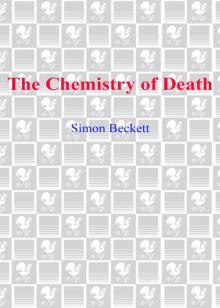 The Chemistry of Death
The Chemistry of Death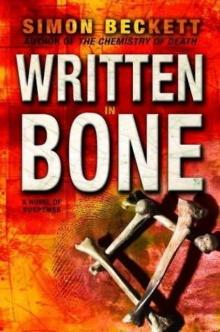 Written in Bone
Written in Bone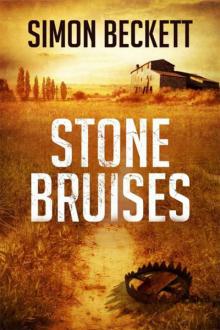 Stone Bruises
Stone Bruises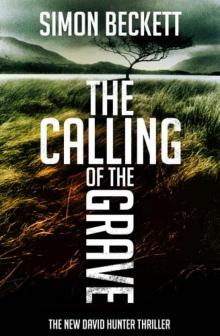 The Calling of the Grave
The Calling of the Grave Whispers of the Dead
Whispers of the Dead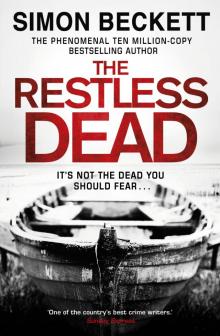 The Restless Dead
The Restless Dead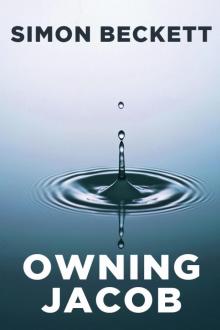 Owning Jacob
Owning Jacob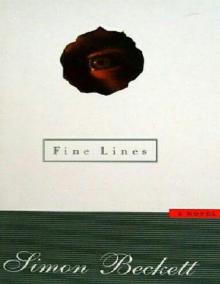 Fine Lines
Fine Lines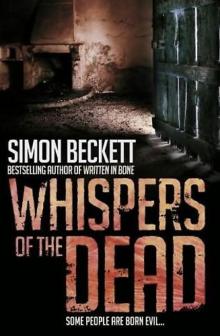 Whispers of the Dead dh-3
Whispers of the Dead dh-3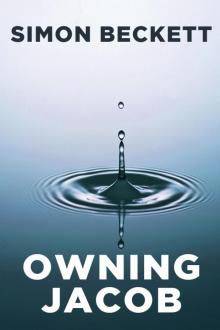 Owning Jacob (1998)
Owning Jacob (1998)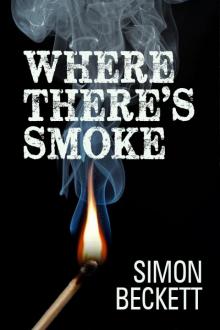 Where There's Smoke (1997)
Where There's Smoke (1997)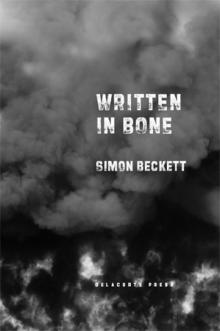 Written in Bone dh-2
Written in Bone dh-2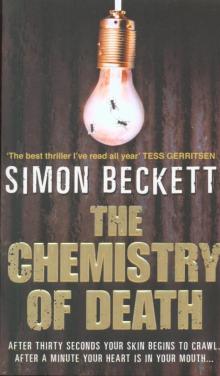 The Chemistry of Death dh-1
The Chemistry of Death dh-1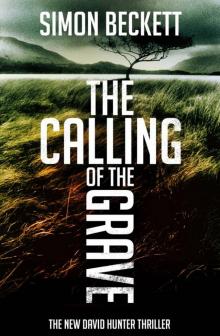 The Calling Of The Grave dh-4
The Calling Of The Grave dh-4